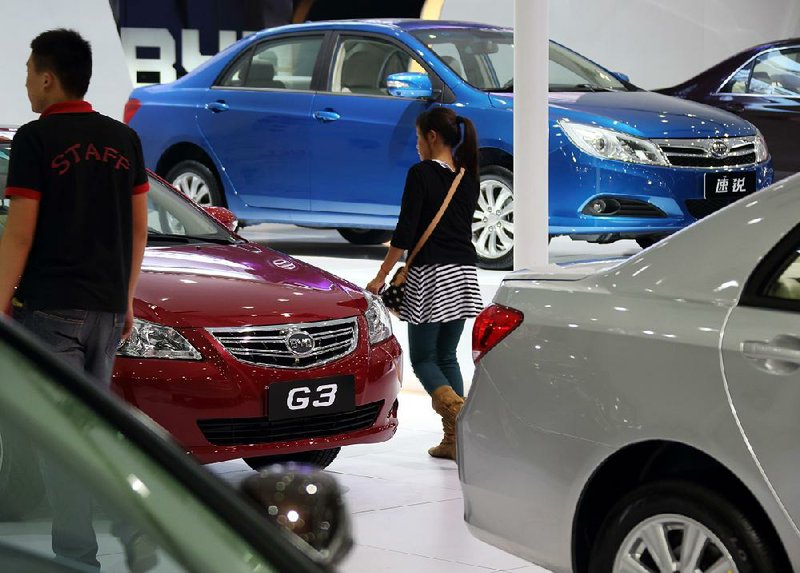Chinese cars are poised to begin hitting U.S. showrooms by as soon as next year.
BYD Co., the Chinese automaker backed by Warren Buffett’s Berskshire Hathaway Inc., plans to introduce about four models for its U.S. debut at the end of 2015, said Stella Li, the senior vice president in charge of the company’s U.S. business. Though BYD wasn’t ready when it earlier sought to enter the U.S. car market in2010, the company is more prepared this time, she said.
“Back then, we had passion, but we had no brand, no history, no capital and no competitive advantage,” said Li, 43, who spoke at BYD’s headquarters in Shenzhen in China’s southern Guangdong province. “BYD has become more fashionable and we have improved our design and safety. We don’t want to compete on price anymore, but on quality and innovation.”
BYD’s U.S. ambitions, echoed by companies from Geely Automobile Holdings Ltd. to Great Wall Motor Co., show how the Chinese are preparing to shake up the U.S. car market as the Japanese and South Koreans did decades earlier.
“Entering the U.S. market carries more symbolic meaning to brand building than actually boosting its bottom line,” said Han Weiqi, an analyst with CSC International Holdings Ltd. in Shanghai. “They really need to make sure cars they deliver there have sound quality in order to avoid adverse impact.”
Still, BYD has a track record of planning bigger than what they can actually deliver, Han said.
BYD is returning its sights to the U.S. after billionaire founder and Chairman Wang Chuanfu completed a three-year reorganization 2013, during which he cut the number of dealerships and narrowed losses at its solar business thanks to state incentives.
Investors have been receptive to BYD’s turnaround.The company, which focuses on electric cars, saw its shares surge 63 percent to $4.90 in Hong Kong trading last year. During the restructuring, profit tumbled 97 percent because of losses at its photovoltaic business, a decline in global battery demand and a slump in auto deliveries.
Even with last year’s gains, BYD’s share price remains less than half the level of the record $11.02 reached in October 2009. That’s still profitable for MidAmerican Energy Holdings Co., a unit of Buffett’s Berkshire Hathaway, which bought 9.9 percent of BYD in 2009 for $1.03 a share.
Technically BYD is already in the U.S. vehicle market, though it sells electric buses to fleet operators, instead of cars to consumers. The company is preparing to begin U.S. production of electric buses in March at its factory in Lancaster, Calif., according to Li. The company had planned to sell its e6 electric hatchbacks in the country by the end of 2010, but that was postponed.
BYD isn’t the only Chinese automaker pursuing the American consumer. Geely, whose parent owns Volvo Cars, plans to export cars developed with the Swedish brand to the U.S.in 2016, Geely Chief Executive Officer Gui Shengyue said in August.
BYD’s Li said the its new Qin plug-in hybrid will likely be the flagship among models introduced in the U.S. The sedan, named after the dynasty founded by the emperor who unified China, went on sale in Beijing on Dec. 17. At a starting price of $31,400 - before government subsidies - the car features headlights inspired by a Chinese calligraphy brushstroke and can travel about 43 miles on a single charge in electric-only mode, according to the company.
Separately, Li said BYD has found it easier to sell its battery-powered K9 bus and e6 car overseas than in Beijing and Shanghai, even though the Chinese company has offered free trials, Li said.
The company failed to qualify for local incentives in the two cities because it’s based in Shenzhen in southern Guangdong province and the local governments have their own automakers to protect, she said.
“It’s disheartening as a Chinese to see how local interests are holding back the adoption of electric vehicles,” Li said. “It’s easier to sell our buses and cars to Sao Paulo, California or Israel than in Beijing and Shanghai. And those places have better air than China.”
Business, Pages 23 on 01/07/2014
